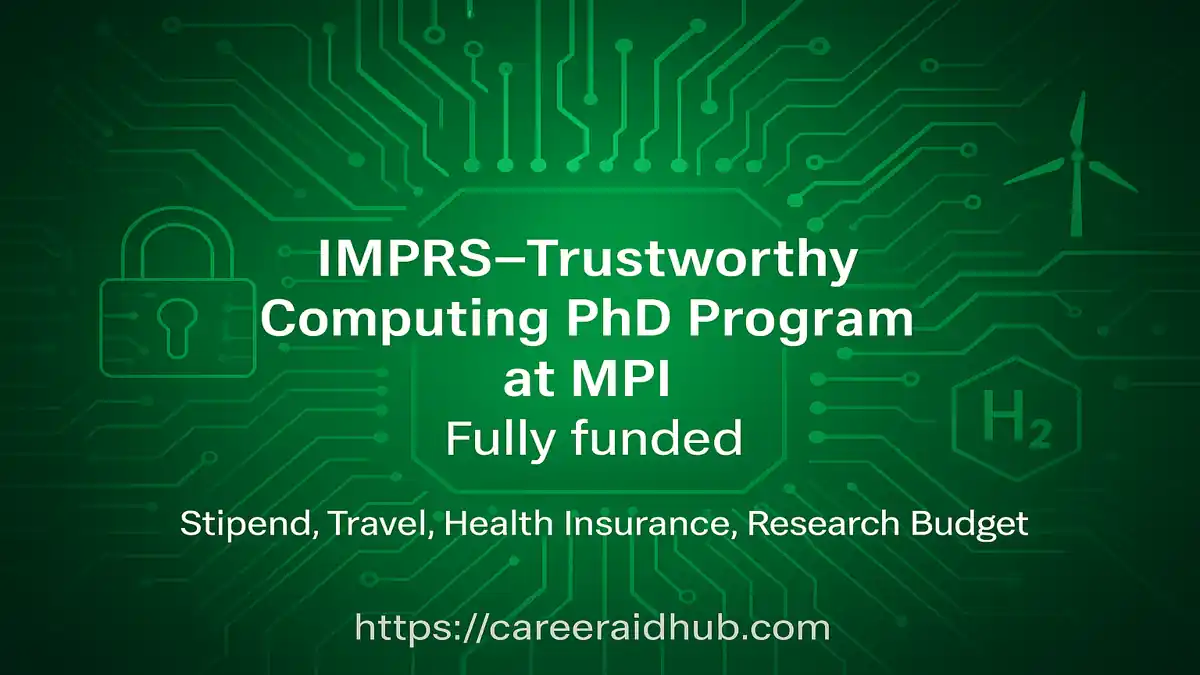CDC Doctoral-Level Fellowships: Active Opportunities for 2025–2026
Introduction
The Centers for Disease Control and Prevention (CDC), in collaboration with leading partners such as the Association of Public Health Laboratories (APHL) and ASPPH, administers a range of competitive, high-impact fellowships designed specifically for doctoral-level researchers. These programs address critical public health challenges through scientific training, applied epidemiology, informatics, and laboratory practice.
As of 2025–2026, several of these prestigious fellowships are open for application, offering flexible start dates, full-time placements, and in some cases, rolling deadlines. Each fellowship targets different domains of public health research and workforce development, serving as a valuable platform for recent PhD, MD, DVM, or DrPH graduates.
For doctoral scholars and public health professionals, CDC fellowships offer a gateway to hands-on research, high-level training, and a direct role in protecting global health. Explore competitive, fully supported programs across lab science, informatics, epidemiology, and policy.
APHL-CDC Laboratory Fellowships (Rolling Admission)
Overview
The APHL-CDC Laboratory Fellowship initiative supports early-career scientists in gaining practical experience in public health laboratory science. Applicants with Master’s or Doctoral degrees in disciplines such as microbiology, bioinformatics, biochemistry, or environmental science are eligible.
Key Features
style="text-align: justify;">
Duration: 1–2 years
Mode: Full-time laboratory placement
Eligibility: Master’s or PhD in relevant life sciences
Application: Rolling basis; no fixed deadline
Host Institutions: State, local, or federal public health laboratories
Fellowship Tracks
-
-
Bioinformatics Fellowship
-
Biorisk Management Fellowship
-
Environmental Health Laboratory Fellowship
-
Food Safety Laboratory Fellowship
-
Infectious Diseases Laboratory Fellowship
-
Informatics Fellowship
-
Quality Management Fellowship
-
Ronald H. Laessig Newborn Screening Fellowship
These fellowships are tailored for individuals seeking specialized, hands-on roles in laboratory operations that support public health responses. The flexibility of rolling admissions allows applicants to time their start dates based on availability and career planning.
Applied Public Health Informatics Fellowship (APHIFP)
Overview
The Applied Public Health Informatics Fellowship (APHIFP) is structured to build informatics leadership capacity within the U.S. public health infrastructure. This fellowship places doctoral-level candidates at state and local health departments, where they support informatics-driven solutions for data integration, disease tracking, and outbreak response.
2025 Status
As confirmed by the CDC, APHIFP is not accepting applications for the 2025 cycle. Interested candidates should continue monitoring the
official portal for updates regarding the 2026–2027 cohort.
Epidemic Intelligence Service (EIS) – Disease Detectives
Overview
The Epidemic Intelligence Service (EIS) is an elite 2-year fellowship program known for training field epidemiologists to lead investigations during public health emergencies. EIS officers work across CDC centers, state health departments, and international response units.
Key Features
-
Duration: 2 years
-
Eligibility: PhD, MD, DVM, DrPH holders with a strong background in epidemiology or clinical/public health research
-
Application Deadline: July 2025 (final date to be updated)
-
Focus: Applied field epidemiology, surveillance, outbreak investigation, policy analysis
This program is best suited for professionals committed to on-the-ground public health interventions and real-time data-driven decision-making during crises such as pandemics, natural disasters, and bioterrorism threats.
Laboratory Leadership Service (LLS)
Overview
The Laboratory Leadership Service (LLS) Fellowship targets the intersection of public health science, quality assurance, and administrative leadership. This two-year fellowship trains doctoral graduates to manage public health laboratories with a focus on biosafety, diagnostic protocols, and regulatory compliance.
Key Features
-
Duration: Approximately 2 years
-
Eligibility: PhD, MD, or DVM with laboratory experience
-
Application Deadline: August 2025 (exact date to be updated)
-
Focus Areas: Laboratory leadership, public health systems, workforce
development
Participants are embedded in CDC labs or partner institutions and engage with real-world challenges such as outbreak testing, antimicrobial resistance, and policy-driven laboratory operations.
ASPPH/CDC Public Health Fellowship
Overview
The Association of Schools and Programs of Public Health (ASPPH) collaborates with CDC to deliver a comprehensive policy and practice-oriented fellowship. This program integrates recent Master’s or Doctoral graduates directly into CDC teams focused on prevention science, health equity, evaluation, and informatics.
Key Features
-
Duration: 1–2 years
-
Eligibility: MPH, DrPH, or PhD in public health or related fields
-
Cycle: Likely closed for 2025; next opening expected January 2026
-
Start Date: September 2026 (tentative)
Ideal for researchers with an interest in systems-level health policy, this fellowship bridges academic training with applied public health outcomes and decision-making.
PHAP – Public Health Associate Program
Overview
Though not targeted toward doctoral applicants, the Public Health Associate Program (PHAP) is a two-year, paid training initiative for recent bachelor’s graduates. PHAP participants receive on-site mentorship and are placed in CDC field programs across the U.S.
2025 Status
As of now, PHAP is not accepting applications for the 2025 cycle due to internal restructuring and budget limitations. Updates regarding future cycles will be posted on the CDC PHAP page.
Fellowship
Comparison Table (2025–2026)
| Fellowship |
Duration |
Status |
Deadline |
| APHL-CDC Laboratory Fellowships |
1–2 yrs |
Rolling admission |
No fixed date |
| Epidemic Intelligence Service (EIS) |
2 yrs |
Open for 2026 cohort |
July 2025 |
| Laboratory Leadership Service (LLS) |
~2 yrs |
Open for 2026 cohort |
August 2025 |
| Applied Public Health Informatics (APHIFP) |
2 yrs |
Not available in 2025 |
TBD |
| ASPPH/CDC Public Health Fellowship |
1–2 yrs |
Likely closed for 2025 |
Opens Jan 2026 |
| PHAP (Bachelor’s Level) |
2 yrs |
Closed for 2025 |
TBD |
Next Steps for Interested Applicants
To increase your chances of securing a CDC fellowship, consider the following action plan:
-
Apply Early for Rolling Fellowships: Start the APHL-CDC application process as soon as possible. Document requirements include CV, academic transcripts, letters of recommendation, and a research statement.
-
Track Deadlines for EIS and LLS: Finalize all documents by June to meet the July and August application cutoffs, respectively.
-
Prepare for 2026 Fellowships: Monitor ASPPH and APHIFP pages for early announcements. Application materials are often required 6 months in advance.
-
Join Email Lists: Subscribe to CDC, APHL, and ASPPH newsletters to stay informed about opening dates, virtual Q&A sessions, and updated eligibility details.
Conclusion
The CDC continues to play a central role in shaping public health policy and scientific leadership in the United States and beyond. Through its structured doctoral-level fellowships, it offers unique pathways for emerging professionals to contribute directly to national and global health priorities.
With a blend of scientific rigor, field immersion, and mentorship, these programs equip researchers with the tools to lead in times of public health crisis and transformation. Applicants should plan ahead, tailor applications to each fellowship’s focus area, and stay aligned with the CDC’s evolving program calendar.
Fellowship Quick Reference
| Feature |
Details |
| Program Name |
CDC Doctoral-Level Fellowships |
| Host Country |
United States |
| Funded By |
Centers for Disease Control and Prevention (CDC) |
| Duration |
1 to 2 years |
| Study Mode |
Full-time, on-site |
| Eligibility |
PhD, MD, DVM, DrPH, MPH, or related fields |
| Financial Support |
Stipend, travel allowance, training, placements |
| Fields of Study |
Epidemiology, Informatics, Lab Science, Policy |
| Application Deadline |
Varies (See above; July–August or rolling) |
| Official Website |
Click Here |
Frequently Asked Questions (FAQs)
What are CDC doctoral fellowships and who can apply? CDC doctoral fellowships are competitive programs for recent PhD, MD, DrPH, or DVM graduates in public health, epidemiology, or lab sciences.
How do I apply for CDC public health fellowships? Visit the official CDC fellowships page, select a program, and submit your application with CV, transcripts, and letters of recommendation.
What is the deadline for Epidemic Intelligence Service (EIS) fellowship? EIS applications usually close in late July; candidates should prepare materials early to meet deadlines.
Are CDC fellowships paid or fully funded? Yes, most CDC fellowships offer stipends, travel support, and professional training at no cost to selected fellows.
Which CDC fellowships accept rolling applications? The APHL–CDC Laboratory Fellowships accept applications year-round with no fixed deadline.
Can international students apply for CDC doctoral fellowships? Some fellowships are open to non-U.S. citizens, but most prioritize U.S. nationals or lawful residents. Always check program-specific eligibility.
What is the duration of CDC doctoral fellowships? Most CDC doctoral-level fellowships run for 1 to 2 years, depending on the program and placement.
What kind of training do CDC fellows receive? Fellows gain hands-on experience in outbreak response, epidemiological surveillance, laboratory diagnostics, and public health policy.
What fields are covered under CDC doctoral fellowships? Fellowships include epidemiology, bioinformatics, lab science, infectious diseases, policy, and health informatics.
How competitive are CDC fellowships for doctoral candidates? These fellowships are highly competitive, so applicants should demonstrate strong academic records, research skills, and public health commitment.
Premium Mentorship for a Stronger Application
- Premium Mentorship: personalised 1:1 guidance for this and similar opportunities
- In-depth review of your CV, academic profile, and key statements
- Aligned with international selection criteria so your profile matches what panels expect
- Stronger, more compelling narrative for highly competitive calls
- Step-by-step support from opportunity mapping to final submission (fee-based)
Subscribe Premium Mentorship










